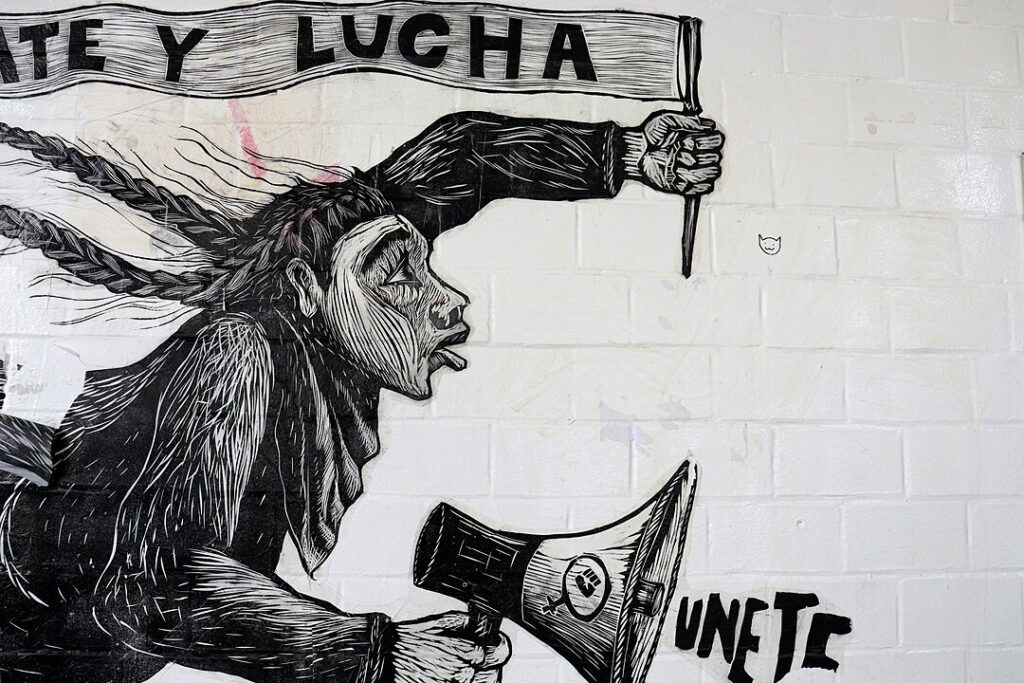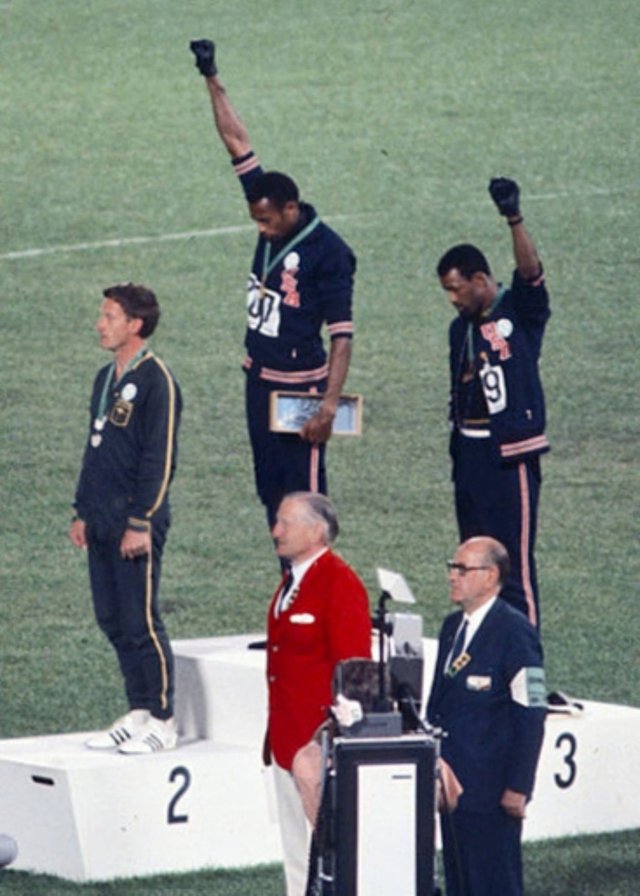As you approach the Facultad de Filosofía y Letras (School of Philosophy and Letters) on the campus of the Universidad Nacional Autónoma de México (UNAM), its political fervor grips you in its fist even before you reach the doors. Radical books cover a dozen tables on the sidewalk. Graffiti and murals protesting femicide, state violence, and transphobia blanket the building. International solidarity flares out from the walls, too, like the large portrait of Philadelphia political prisoner Mumia Abu-Jamal, with the caption: “38 AÑOS encarcelado por hablar en favor de la libertad y contra la injusticia social. ¡MUMIA LIBRE!” (“38 YEARS imprisoned for speaking out in favor of freedom and against social injustice. FREE MUMIA!”)
Entering the building, the radical spirit carries on, as you see the Videoludoteca Víctor Jara, a video library named after the Chilean folk singer arrested, tortured, and murdered during the first days of the Pinochet dictatorship in 1973. Fliers for demonstrations cover the walls.

La Facultad de Filosofía y Letras is a collective space where truth, justice, and activism are pursued unapologetically. For a hundred years organizers here have built movements related to struggle, memory, human rights, and democracy. Its murals and graffiti are themselves demands to not lose sight of past gains that people fought for and that should not be forgotten.
On the evening of January 23, 2024, la Facultad de Filosofía y Letras saw the emergence of a new collective, one which follows in this tradition and now rises in response to one of the worst atrocities in the lifetimes of many of the building’s community: Académicxs con Palestina contra el Genocidio.
The fliers and social media produced ahead of the event advertised a specific room in la Facultad de Filosofía y Letras in which the gathering would be held. But fifteen minutes before it was set to begin, every seat was filled, every corner crowded, and the throng was already spilling out into the hall. The organizers had to move everyone to a larger room, and still a couple dozen in the crowd of at least 150 people had to stand along the walls. Many more joined on Zoom.
Académicxs con Palestina was originally conceived in the days following the events of October 7 as an initiative between some members of a group called Judíos con Palestina (Jews with Palestine) and people from the university communities in Mexico. Its founding members refused to be silent not only about the genocide of the Palestinian people, but also the destruction of Gazan cultural heritage and the physical disappearance of a large number of musicians, poets, painters, and other artists, as well as many Palestinian academics who those in the collective consider their colleagues.
The large event on January 23 was in part a public announcement of two open letters. One letter is addressed to the presidents in Latin America who are considered progressive, demanding that they assume a more vehement condemnation of the genocide perpetrated against Gazans, while the other is addressed to various university authorities, requesting they also speak out.
The demands are not flimsy liberal nostrums that perform grand acrobatics in order to offend no one. Their open letter includes a link to the Boycott, Divestment and Sanctions (BDS) Movement, as well as calls for “definitive cessation of the purchase of products and services from companies that openly support Zionism, such as IBM, HP, etc. listed by the BDS Movement.” In addition, it demands the suspension of all agreements, academic links, and collaboration between universities in Mexico and the State of Israel, which they say are “responsible for normalizing the ethnic cleansing and colonialism promoted by Zionism.”
As the crowd gathered in the larger room, people began passing out two sets of bumper stickers, each with an image of a heart and fist that reads, “LIBERA A PALESTINA YA!” (“FREE PALESTINE NOW!”) and “TERMINA EL APARTHEID” (“AN END TO APARTHEID!”)
One also contains the text, “FIN AL TRATADO DE LIBRE COMERCIO ENTRE ISRAEL Y MÉXICO” (“END TO THE FREE-TRADE AGREEMENT BETWEEN ISRAEL AND MEXICO”). And the other reads, “BOYCOTT A LAS MARCAS DE EUA QUE APOYAN AL EJÉRCITO DE ISRAEL” (“BOYCOTT U.S. BRANDS THAT SUPPORT THE ISRAELI MILITARY”), and includes the logos of Starbucks, McDonalds, Amazon, and more.
One speaker began the meeting in a formal address to the students, manual workers, administrators, and teachers of the collective’s universities and study centers, as well as to the media, and to the people of Mexico.
What is happening today in Gaza is the continuation of a long colonialist settlement project that created a true apartheid regime against the Palestinians. Israel today is committing open war crimes by intentionally targeting civilians, UN personnel and facilities, humanitarian personnel and the press, as well as destroying housing, health, education, and cultural infrastructure that can in no way be considered military targets. The intention to partially or totally destroy the Palestinian people has been manifested in numerous expressions by members of the Netanyahu government; and the indiscriminate killing of children and women, added to the conditions of cruelty and intentional subjugation to force them to move, are all elements established in the Rome Statute as part of the definition of genocide. The academic and research communities have the intellectual, ethical, and political responsibility to characterize, denounce, and point out these genocidal actions of the State of Israel, and to name them as their victims do: nakba.
At a pause between speakers, someone began to chant: “¡Todxs somos Gaza! ¡Contra genocidio!” (“We are all Gaza! Against genocide!”) The entire room joined in.
Following the speakers, the panel took at least a dozen comments and questions, many from student groups organizing to apply their own pressure and power against genocide. Although Académicxs con Palestina groups together only professors and researchers, its members at UNAM are proud of student participation in marches and rallies, conferences and cultural events, and more. As the struggles escalate, Académicxs con Palestina hopes to strengthen its relations with these student collectives.
As the event came to a close, everyone stood in silence as one member of the panel read dozens upon dozens of names of academics in Palestine who have been killed by Israel in the past several months. A long, complete moment of silence followed. Finally, a panelist said, “Muchas gracias. Sigamos organizándonos. ¡Palestina libre!” (“Thank you. Let’s keep organizing. Free Palestine!”) The room erupted in applause.
The coalition’s two letters have now been signed by more than a thousand academics from across universities in Mexico, throughout Latin America, in Madrid and London, and at institutions such as Arizona State University, Berkley College of Music, and the University of North Carolina at Chapel Hill. The letter to the progressive governments of Latin America has been signed by more than 1,700 people. And the numbers rise each day.
After the event, I exchanged emails with Marcela Gómez and Enrique Rajchenberg, members of the collective and professors at UNAM. Like many in Académicxs con Palestina, they have been encouraged by the reception of the collective, the event and the open letters. They wrote:
We have been pleasantly surprised by the reception that our statements have had in the academic world—on the one hand, because we have received the support of colleagues from a large number of universities throughout Mexico, but also from the rest of the world, especially from Latin America, Europe, the United States, and Canada, although to a lesser extent. The number of signatures changes daily as … the documents are disseminated and reach more people. We believe that this is due to the fact that, although for many academics the Palestinian genocide is an unjustifiable act, there was no collective response that provided both a precise political-intellectual definition and a proposal for action.
Their plans are far from finished:
In the coming days, we are arranging an interview with the rector of UNAM, the largest educational institution in the country, in which we wish to deliver the letter in which we propose the cancellation of UNAM’s cooperative relations with its Israeli counterparts and the demand for a statement by the university authorities regarding the Israeli aggression against the Palestinian people.
Simultaneously, we have organized permanent forums entitled “No dejemos de hablar de Palestina” (“Let’s not stop talking about Palestine”) that will take place in various university centers with the participation of members of the group, and whose objective is to make visible the problems that gave rise to Académicxs con Palestina and to offer elements of deeper analysis of the situation in the Middle East.
Everyone in Académicxs con Palestina feels great urgency. In their email, the professors cited part of the collective’s demands that were read on January 23:
The bombardments continue. Humanitarian aid cannot access the Gaza Strip. Palestinians continue to be killed. We live in a global emergency. Palestine is not just another conflict. The future of humanity is at stake in Palestine. Either the ongoing genocide is stopped, or we will succumb to the obvious collapse and illegitimacy of the international system that will not have prevented the mass death that we can all see in real time. Today we are all Gaza. And today we must all defend, in the name of humanity and justice, Palestine.
Less than half a mile from the room in which so many had gathered on January 23 to build collective power against occupation, apartheid, and genocide, the sun was setting over the Estadio Olímpico Universitario. In October 1968, only ten days before the opening ceremony of the Mexico City Olympics, the Mexican Armed Forces opened fire on protesters in the Plaza de las Tres Culturas in Mexico City’s Tlatelolco neighborhood. In what is now known as the Tlatelolco Massacre, the soldiers and police slaughtered hundreds and arrested thousands, many of them students at UNAM.
Just two weeks after the massacre, it was from a podium on the hallowed ground of the Estadio Olímpico Universitario that the United States’ gold- and bronze-medal sprinters Tommie Smith and John Carlos famously raised their fists in a Black Power salute during the playing of the “Star Spangled Banner.” Throughout 1968, people were rising up against state violence and complicity not only in Mexico, but across the United States, and in Paris, in Rio de Janeiro, Derry, Prague, and far beyond. Their collective courage shook the world.

While the image of Smith and Carlos has been immortalized and even somewhat sanctioned—the two men were honored by President Barack Obama at the White House in 2016—the aftermath in 1968 was far different. Due to their courage on the podium in Mexico City, they both were banned from the Olympic Games for life. Their courage and sacrifice is a model for all of us protesting against genocide today.
The gates at the Olympic Stadium are now closed. Unless los Pumas de la UNAM football club has a home match, there is no public entry. Approaching the stadium from campus, the verdant pitch beyond its vast stone walls is not visible. That history is kept from view, locked and guarded. But if you position yourself correctly, you can glimpse the interior through a gate: a bright green strip of grass beyond the wall—and if you’re lucky, as I was, the clear blue sky above the wall, and sunlight everywhere.
Once again, it is not only terror but courage and solidarity, too, that rattles the world. And at UNAM and to be sure far beyond, what we refuse to lose sight of will sustain our collective resistance.
For any academics—professors and researchers—interested in signing the Académicxs con Palestina open letters, follow links here and here.
And be sure to follow Académicxs con Palestina online and on social media:
Featured image credit: Alfo Medeiras; modified by Tempest.
Opinions expressed in signed articles do not necessarily represent the views of the editors or the Tempest Collective. For more information, see “About Tempest Collective.”

